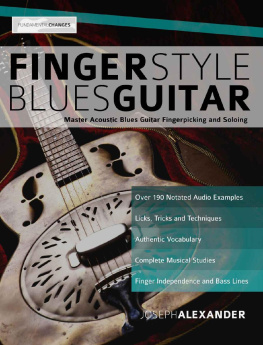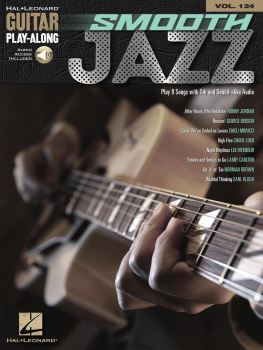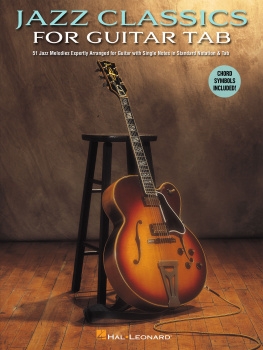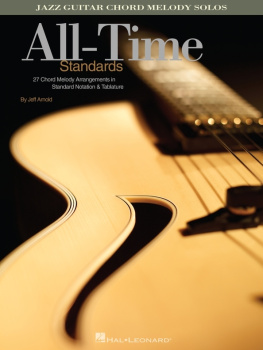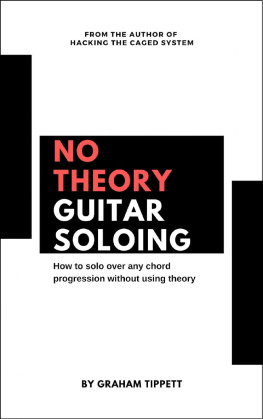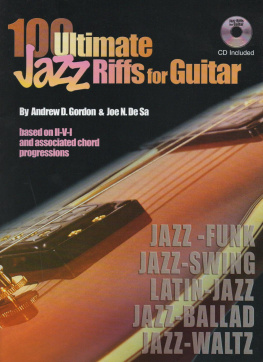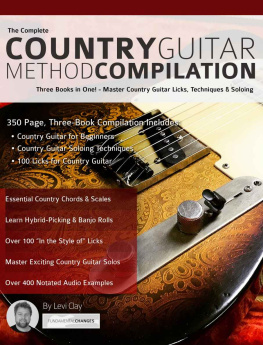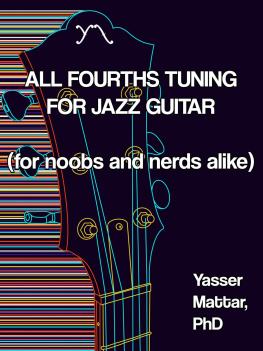Joseph Alexander - Chord Tone Soloing for Jazz Guitar: Master Arpeggio-Based Soloing for Jazz Guitar (Play jazz guitar)
Here you can read online Joseph Alexander - Chord Tone Soloing for Jazz Guitar: Master Arpeggio-Based Soloing for Jazz Guitar (Play jazz guitar) full text of the book (entire story) in english for free. Download pdf and epub, get meaning, cover and reviews about this ebook. year: 2015, publisher: www.fundamental-changes.com, genre: Children. Description of the work, (preface) as well as reviews are available. Best literature library LitArk.com created for fans of good reading and offers a wide selection of genres:
Romance novel
Science fiction
Adventure
Detective
Science
History
Home and family
Prose
Art
Politics
Computer
Non-fiction
Religion
Business
Children
Humor
Choose a favorite category and find really read worthwhile books. Enjoy immersion in the world of imagination, feel the emotions of the characters or learn something new for yourself, make an fascinating discovery.

- Book:Chord Tone Soloing for Jazz Guitar: Master Arpeggio-Based Soloing for Jazz Guitar (Play jazz guitar)
- Author:
- Publisher:www.fundamental-changes.com
- Genre:
- Year:2015
- Rating:4 / 5
- Favourites:Add to favourites
- Your mark:
- 80
- 1
- 2
- 3
- 4
- 5
Chord Tone Soloing for Jazz Guitar: Master Arpeggio-Based Soloing for Jazz Guitar (Play jazz guitar): summary, description and annotation
We offer to read an annotation, description, summary or preface (depends on what the author of the book "Chord Tone Soloing for Jazz Guitar: Master Arpeggio-Based Soloing for Jazz Guitar (Play jazz guitar)" wrote himself). If you haven't found the necessary information about the book — write in the comments, we will try to find it.
Joseph Alexander: author's other books
Who wrote Chord Tone Soloing for Jazz Guitar: Master Arpeggio-Based Soloing for Jazz Guitar (Play jazz guitar)? Find out the surname, the name of the author of the book and a list of all author's works by series.
Chord Tone Soloing for Jazz Guitar: Master Arpeggio-Based Soloing for Jazz Guitar (Play jazz guitar) — read online for free the complete book (whole text) full work
Below is the text of the book, divided by pages. System saving the place of the last page read, allows you to conveniently read the book "Chord Tone Soloing for Jazz Guitar: Master Arpeggio-Based Soloing for Jazz Guitar (Play jazz guitar)" online for free, without having to search again every time where you left off. Put a bookmark, and you can go to the page where you finished reading at any time.
Font size:
Interval:
Bookmark:
Master Arpeggio-based Jazz Bebop Soloing for Guitar
2nd Edition
Published by www.fundamental-changes.com
Copyright 2019 Joseph Alexander
The moral right of this author has been asserted.
All rights reserved. No part of this publication may be reproduced, stored in a retrieval system, or transmitted in any form or by any means, without the prior permission in writing from the publisher.
The publisher is not responsible for websites (or their content) that are not owned by the publisher.
Cover image: Shutterstock Timof
Chord Tone Soloing for Jazz Guitar
Complete Technique for Modern Guitar
Fundamental Changes in Jazz Guitar
Guitar Chords in Context
Voice Leading Jazz Guitar
100 Classic Jazz Licks for Guitar
Modern Jazz Guitar Concepts with Jens Larsen
Jazz Blues Soloing for Guitar
Jazz Guitar Chord Mastery
Minor ii V Mastery for Jazz Guitar
Sight Reading Mastery for Guitar
The Circle of Fifths for Guitarists
The Complete Jazz Guitar Soloing Compilation
The First 100 Jazz Chords for Guitar
The Jazz Guitar Chords Compilation
The Melodic Minor Cookbook
Martin Taylor Beyond Chord Melody
Martin Taylor Walking Bass for Jazz Guitar
Jazz Bebop Blues Guitar
Jazz guitar soloing can be a complex affair, especially when it comes to soloing over chord changes.
In contrast to modern pop songs, jazz standards often change key many times in the space of just one chorus. This level of harmonic complexity can force the soloist to navigate a minefield of theoretical concepts while trying to find something musical and creative to play. It is normally the case that thinking too much while playing is the biggest obstacle to spontaneous creativity.
It is also true, however, that in order to play the right notes at the right time, the soloist must know the chord changes inside out. A deep understanding of how the song is constructed is essential if solos are to flow freely and creatively.
Finding the balance between a cerebral and a truly spontaneous improvisational approach is one of the most important challenges that any jazz musician faces.
Along with understanding and memorising a jazz chord progression, guitarists often find themselves with the additional, instrument-specific challenge of learning to play the correct chords, scales and arpeggios all over the neck . Unlike with the piano, there can be many different shapes to learn for just one arpeggio.
Learning to play all the arpeggio and scale shapes for just one chord is challenging enough, and this task is compounded when you consider that chords are rarely played in isolation. When you solo over two or more chords in a sequence, it can start to feel like youre walking through treacle.
With hundreds of jazz standards to learn, even finding a starting point can be difficult when it comes to learning to solo on the guitar.
Of course, if jazz soloing was really seen in these terms, no one would ever dare to play a note. The answer to all of these challenges is to simplify our thinking and to find the common ground that forms the basis for the majority of jazz progressions.
The first thing to realise about jazz is that there arent actually as many jazz chord progressions as you might think. While there are hundreds of jazz songs, many of them use incredibly similar sequences of chords. For example, it was common during the bebop period for players such as Charlie Parker and Dizzy Gillespie to write new melodies over the same chord changes as existing songs.
The melodies of Anthropology (Parker/Gillespie), Moose the Mooche (Parker) and Oleo (Rollins) are all played on the chord changes of I Got Rhythm (George Gershwin).
During the bebop period, jazz was probably at its most complex in terms of navigating difficult chord progressions. The Hard Bop and Modal periods that followed were generally less harmonically complex which, in turn, allowed soloists to be more melodically adventurous. Obviously there will always be exceptions to this rule, notably in some forms of jazz fusion and also John Coltranes Giant Steps period.
This book examines and teaches you to solo over the thirteen most commonly occurring chord progressions which form the backbone of jazz.
I cant say this book covers every possible chord sequence that you will come across in your journey as a jazz soloist, but the chord progressions addressed in these pages will occur time and time again in your studies. These common structures form the basis of all jazz music.
Now we have reduced our focus of study to just the thirteen most common chord progressions in jazz, we can turn our attention to some of the specific challenges of the guitar.
The greatest priority of any musician should be to simply make music . Forgetting all the perceived complexities of jazz soloing for a minute, if there were a simple way to create a memorable melody over a chord progression, shouldnt that the obvious starting point?
Sometimes, jazz chord sequences can be approached by using just one parent scale. For example, the chords in the following sequence all belong to the key of Bb Major:

You can solo over this whole progression using the Bb Major scale and most notes in Bb Major will sound good at any point in the progression. This approach is fairly common in pop and rock music.
The problem with a scalic approach is that jazz (and especially bebop) doesnt often form its melodies around scales. It instead tends to view each chord as a separate unit and improvisations are based around the arpeggio of each chord, rather than the parent scale of the progression.
An arpeggio is simply the notes of a particular chord played in sequence rather than all at the same time. You can think of playing an arpeggio as sounding out the syllables of the chords one by one, just as a young child might sound out the word di-no-saur. When you play an arpeggio, you are spelling out the chords in your solo and articulating their unique sound.
Arpeggios are the basis of jazz soloing and there are various ways of linking different arpeggios in a chord sequence together. It is the targeting of arpeggio notes over changing chords that forms the backbone of jazz soloing.
Think of arpeggios as the skeleton of a jazz solo and the scales and substitutions that can be used as the flesh and features that sit on the skeleton to add interest and human uniqueness to the solo.
This book teaches you to link together arpeggios over the most common chord progressions in jazz, along with some important substitutions and some tips and tricks for easier, more creative soloing.
While all the chords in a sequence might belong to one parent scale, arpeggios are the tools that help us play the correct scale notes over the correct chord .
Referring to the previous diagram, the parent scale of Bb Major contains all the notes from the arpeggios of Cm7, F7 and BbMaj7 as shown in the following table.
Scale of Bb Major: Bb C D Eb F G A
Chord | Arpeggio Notes | |||
Cm7 | C | Eb | G | Bb |
F7 | F | A | C | Eb |
BbMaj7 | Bb | D | F | A |
As you can see, the arpeggio notes of each chord are all contained within the parent scale of Bb Major, but each chord only contains a selection of four notes.
Font size:
Interval:
Bookmark:
Similar books «Chord Tone Soloing for Jazz Guitar: Master Arpeggio-Based Soloing for Jazz Guitar (Play jazz guitar)»
Look at similar books to Chord Tone Soloing for Jazz Guitar: Master Arpeggio-Based Soloing for Jazz Guitar (Play jazz guitar). We have selected literature similar in name and meaning in the hope of providing readers with more options to find new, interesting, not yet read works.
Discussion, reviews of the book Chord Tone Soloing for Jazz Guitar: Master Arpeggio-Based Soloing for Jazz Guitar (Play jazz guitar) and just readers' own opinions. Leave your comments, write what you think about the work, its meaning or the main characters. Specify what exactly you liked and what you didn't like, and why you think so.

